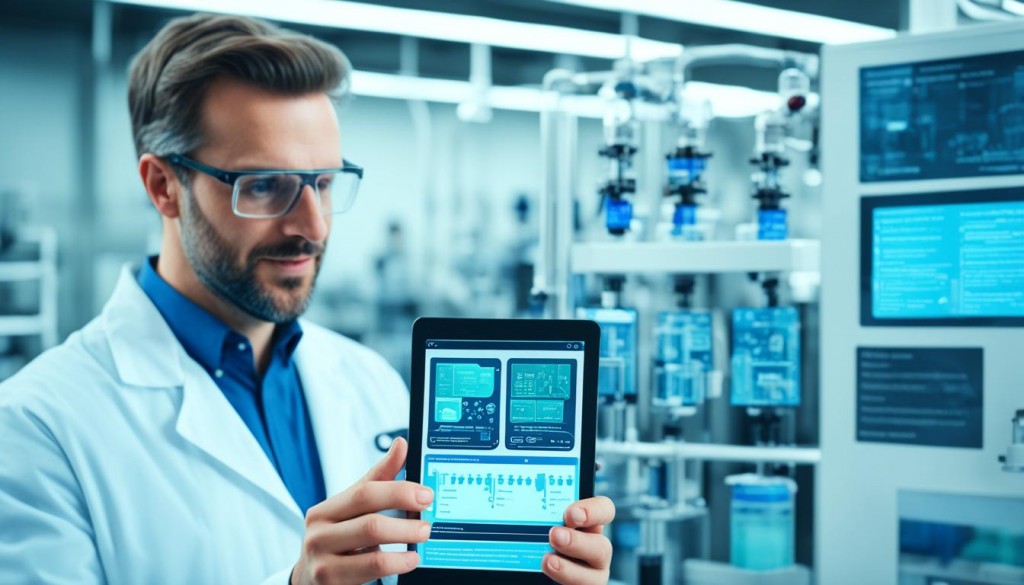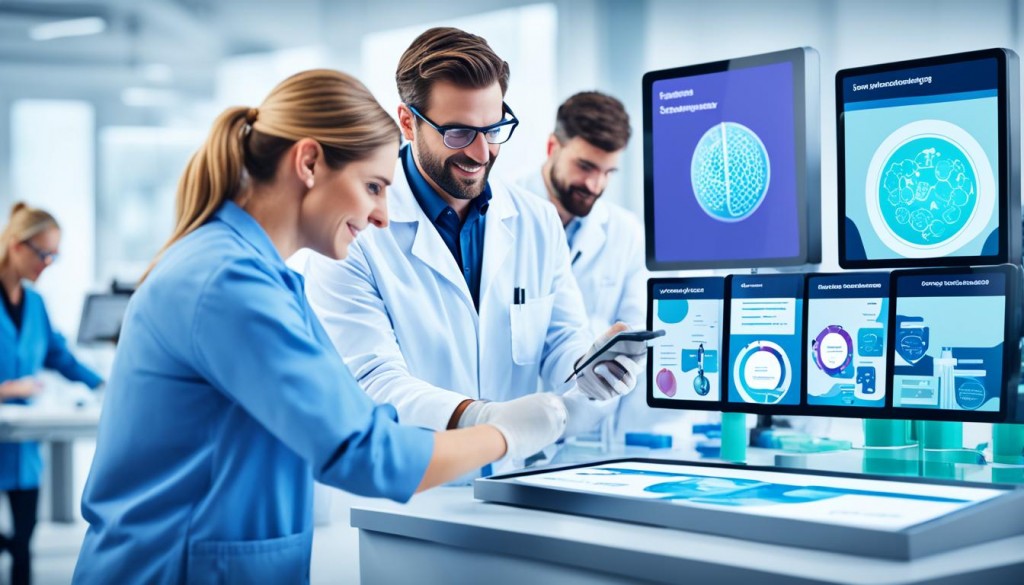July 28, 2025
In the dynamic context of Life sciences, the challenges are specific and demanding. Industry 4.0 is transforming practices, requiring rapid adaptation. The micro learning presents itself as an innovative solution for the Life Science industry, including the pharmaceutical industry, meeting these requirements.Imagine training your teams effectively, without compromising production.The micro learning offers this flexibility, allowing learning to be integrated into daily life. This approach is particularly suited to Industry 4.0, where agility is essential. At Sinfony, we understand the challenges of your sector. Our solution combines digital training in micro learning and support in the field. This model of Blended Learning guarantees a rapid and economical increase in skills, while respecting the standards of the pharmaceutical industry.
Industry 4.0 marks a major revolution in the Life Science sector, redefining work practices and the skills required in pharmaceutical production. This technological transformation poses significant challenges for players in this field. The place of automation is increasing considerably in laboratories and production units. Collaborative robots and autonomous systems play a key role in optimizing processes, reducing errors, and increasing productivity. This evolution requires employees to adapt quickly to new technologies. Digitalization is transforming data management in the pharmaceutical industry. Predictive analytics tools and big data facilitate more informed decision-making, from research to marketing. Professionals need to master these tools to remain competitive. 'interconnection of processes is at the heart of Factory 4.0, revolutionizing the value chain. Cyber-physical systems promote communication between machines, products, and humans. This integration improves traceability and quality, which are essential in pharmaceutical production.
“Industry 4.0 is not only a technological evolution, it is a cultural transformation that is reshaping the entire Life Science sector.”
Faced with these changes, continuing education is becoming crucial. Businesses need to rethink their learning strategies to adapt to this new dynamic and complex environment.
The pharmaceutical industry is facing specific training challenges. Laboratories must adapt quickly to changes in the sector while guaranteeing irreproachable quality. This adaptation requires a constant capacity for innovation.
Quality procedures are becoming more complex, making quality documentation more and more extensive. This poses a challenge for employees who need to stay up to date. Laboratories need to develop effective strategies to train their staff on these changing requirements.
Technologies and regulations are changing rapidly, requiring continuing education. Employees need to update their knowledge regularly to maintain their performance. This requirement represents a significant challenge for laboratory human resources.
Traditional training methods are often time consuming and expensive. They can disrupt production and affect profitability. Laboratories are therefore looking for solutions to train effectively without compromising their operations.
“Training in the pharmaceutical industry must evolve to meet current challenges while still complying with regulatory requirements.”
Faced with these challenges, new training approaches are emerging. They aim to combine efficiency, flexibility and compliance with the strict standards of the pharmaceutical sector.
The microlearning is revolutionizing training in the pharmaceutical industry. This innovative educational approach offers short and targeted content, perfectly adapted to the constraints of the sector. Unlike traditional methods, the she offers unparalleled flexibility. Imagine training modules lasting 5 to 10 minutes, accessible on a smartphone or tablet. These learning capsules cover a specific subject, such as quality procedure or a specific regulation. The advantage? You can learn at your own pace, between tasks, or in your free time.
“The microlearningis learning adapted to the digital age and time constraints.”
This approach fits perfectly into a strategy of hybrid training or Blended Learning. You thus combine the advantages of digital technology with practical sessions in the field. The result? More effective and better retained training.
Microlearning meets the challenges of the pharmaceutical industry: rapid updating of knowledge, regulatory compliance and optimization of training costs. This modern approach is particularly relevant in the face of the growing complexity of the Life Science sector in the era of Industry 4.0.
Microlearning has multiple advantages for pharmaceutical companies that want to optimize their training. This method is perfectly adapted to the requirements of the sector, offering an effective solution to time and budget constraints.
Microlearning allows employees to access content at any time and from any location. This flexibility is crucial in a sector where time is precious and schedules are busy.

By adopting micro learning, pharmaceutical companies can make significant savings. This method reduces the costs associated with travel and the organization of face-to-face training, while increasing the effectiveness of learning.
Microlearning improves the memory of information through short and targeted sessions. This method is particularly effective for training in good practices and regulatory procedures, which are essential in pharmaceutical research.BenefitImpact on the pharmaceutical companyFlexibilityAdaptation to busy scheduleCost reductionOptimization of the training budgetKnowledge retentionBetter application of proceduresBy integrating micro learning into their strategy blended learning training, pharmaceutical companies are optimizing their learning process. This innovative approach makes it possible to train teams effectively while adapting to the constraints of the sector.
The adoption of micro learning in the training of a French pharmaceutical group requires a meticulous strategy. Laboratories need to identify critical areas of training. A thorough analysis of skills needs is essential to target topics adapted to micro learning. Regulatory updates and security procedures are proving to be particularly relevant. Selecting the right platform is crucial. It is recommended to choose a user-friendly tool that can facilitate the creation and distribution of short modules. Accessibility on various devices guarantees optimal flexibility.Content creation requires special attention. It is essential to break down courses into 3 to 5 minute modules, focused on specific learning objectives. The use of various formats, such as videos, quizzes or infographics, promotes the engagement of learners. The participation of business experts in the design of the modules is essential. Their expertise ensures the relevance and accuracy of the content, especially with regard to regulatory aspects of the pharmaceutical industry. Measuring the effectiveness of the micro learning strategy is essential. Completion rates, evaluation results and user feedback should be analyzed. This approach makes it possible to continuously optimize training.
La hybrid training revolutionizes learning in French pharmaceutical laboratories. This innovative concept combines the advantages of digital and face-to-face for an optimal experience.
Blended learning, or hybrid training, combines online sessions and practical training. In the sector Lifescience, this approach makes it possible to combine theory and the concrete application of knowledge.

Microlearning modules provide theoretical foundations, while field training makes it possible to put these skills into practice. This complementarity reinforces the assimilation of procedures by the employees of French pharmaceutical laboratories.
La hybrid training offers flexibility and customization. Learners progress at their own pace online and then consolidate their knowledge during supervised practical sessions. This format adapts to the constraints of the sector. Lifescience while ensuring effective learning.ComponentBenefitsOnline micro learningFlexibility, rapid content updatesField trainingPractical application, direct feedbackBlended learningIncreased efficiency, adaptation to needs
In the landscape of Life Science training providers, Sinfony is distinguished by a revolutionary approach to training. This company has developed a unique solution to overcome the challenges of industry 4.0. Faced with the high costs and inefficiency of regulated technical training, Sinfony has developed an innovative alternative. Their method makes it possible to quickly train all employees of a site in Good Practices, while controlling expenses. The secret of Sinfony? in a range of digital microlearning courses, complemented by support in the field. This blended learning strategy is particularly effective in the context of a pharmaceutical research laboratory.
“Our solution makes it possible to combine flexibility and efficiency, two crucial elements in the modern pharmaceutical industry”
The advantages of this method are numerous:
By adopting this innovative approach, Sinfony demonstrates that it is possible to harmonize the training requirements of a large pharmaceutical laboratory with the operational constraints of Industry 4.0.
Microlearning is radically transforming regulatory compliance in the French pharmaceutical industry. This innovative method ensures instant adaptation to regulatory changes, offering effective training to employees.
Quality procedures are constantly evolving in the pharmaceutical field. Microlearning offers a flexible solution to keep personal knowledge up to date. Thanks to short and focused modules, the new guidelines are disseminated quickly, ensuring rapid compliance by the organization. quality documentation is also benefiting from this approach. Employees have easy access to concise training on the latest updates, ensuring the correct understanding and application of the new procedures.
Microlearning significantly improves the traceability of regulatory training. Digital training platforms offer precise monitoring of the modules completed by each employee. This traceability simplifies audits and demonstrates the company's compliance with regulatory requirements.AspectImpact of micro learningUpdate of proceduresFast and targeted distributionUnderstanding of new guidelinesImprovement through short modulesTraceability of trainingPrecise monitoring and facilitation of auditsBy adopting micro learning, the French pharmaceutical industry optimizes its regulatory compliance, reducing costs and training time. This approach is particularly effective in a sector where rapid response to regulatory changes is essential.
Industry 4.0 defines a framework for the adoption of advanced technologies, aimed at revolutionizing production processes. In the field of training, these innovations open new doors for micro learning. Pharmaceutical factories are turning to digital tools to optimize their training, offering increased flexibility. Augmented reality and virtual reality are reinventing the learning experience in the pharmaceutical sector. These technologies allow learners to immerse themselves in realistic simulations, offering total immersion in the factory environment without the physical risks. This facilitates familiarization with equipment and procedures, ensuring optimal safety. Artificial intelligence is increasingly part of the personalization of training courses. By analyzing individual progress and preferences, she adjusts content to maximize learning. This tailored approach is crucial in the Life Science sector, where educational requirements vary widely across positions and regulations. Mobile micro learning platforms are experiencing significant growth in the pharmaceutical industry. They offer access to short and targeted modules from mobile devices, promoting continuous learning. This flexibility is essential to keep skills up to date in a sector that is constantly evolving.
Microlearning represents a form of training structured around small modules, designed for the acquisition of knowledge in accessible stages. This approach is perfectly suited to The digital age, meeting the demands of contemporary time and attention.
The pharmaceutical industry is facing challenges of increasing regulatory complexity, a need for continuing education and operational constraints. Microlearning is a flexible and effective solution to overcome these obstacles.
Major benefits of microlearning include increased flexibility and accessibility of training, reduced costs associated with traditional training, and improved knowledge retention through fragmented learning.
The integration of micro learning requires an analysis of training needs, the development of adapted content, the establishment of a distribution platform and the monitoring of learners' progress. A step-by-step strategy and clear communication are crucial.
Blended learning combines digital microlearning and practical training in the field. This fusion makes it possible to exploit the advantages of both approaches for an optimal learning experience, ideal for the needs of the pharmaceutical industry.
Microlearning makes it easy to quickly update quality procedures and regulatory requirements. It offers better traceability and effective monitoring of training courses, thus strengthening compliance.
Technologies such as augmented reality, virtual reality, artificial intelligence and mobile applications are essential for the dissemination and personalization of micro learning in Industry 4.0 and the digitalization of processes.
Des formations conçues par des experts métier, régulièrement mises à jour pour coller aux exigences terrain. Découvrez nos modules les plus suivis et les mieux notés par les professionnels.

Formation complète sur les Bonnes Pratiques de Fabrication (BPF) adaptée à votre profil professionnel dans l'industrie pharmaceutique et vétérinaire.

Maîtriser les techniques et les procédures essentielles.

Les procédures essentielles d'hygiène et de sécurité pour le personnel...